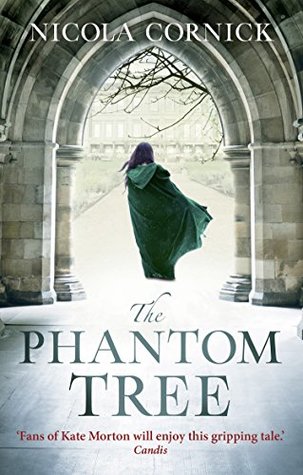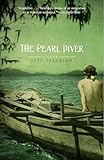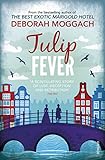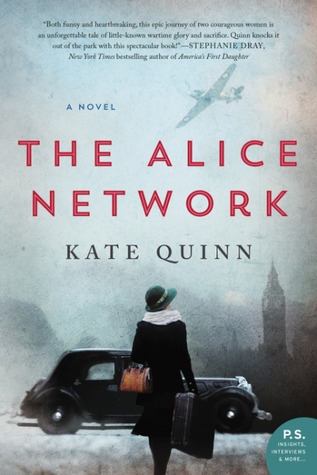Historical Fiction

Allison Bannister has been tracking the history of Mary Seymour, daughter of Queen Katherine Parr. When she comes across a recently discovered portrait of Anne Boleyn, Allison knows better and that it's truly Mary. Allison knows this because she lived with Mary in Wolf Hall before she made the leap in time to current day. Allison was a teenager living in Wolf Hall when she fell in love with her cousin and steward of the house Edward Seymour. She ended up getting pregnant and sent away then her child was taken from her when she gave birth. She roomed with Mary and though they hated each other at first, they needed each other and grew to respect each other. Mary had special abilities to see the future so Allison looked to Mary to help her find her son Albert. Mary looks to Allison to save her from being tried as a witch.
The story is told from Allison and Mary's perspective. Allison is in current time to survive and see if she can't find her son through history. Mary is in the 1500s, after being pushed aside. Both struggle with similar problems despite the time gap and they never forget the promises they made to each other. Allison is not only searching for her son, but also her friend Mary to find out what happened to her.
Mary Seymour's story in real life is pretty mysterious, so Cornick takes what history knows and builds around that quite well. The magical/fantastical element makes this unrealistic but it's still a fun 'what if' story.
The historical fiction and character relationships were the best part of this book. Mary's story from the 1500s seemed well researched and flowed very well. The relationship between Mary and Allison, as well as any of the other characters was believable and endearing.
Where this book lacked was in the time travel element. Allison traveled forward in time by 500 years yet had no problem coping with any of the technical or cultural changes. She was driving a car (how?) and wearing modern clothes without issue. Characters had no problem believing that she was a time traveler. It was a tough pill to swallow and it nagged at me throughout the entire book.
Despite this, it's still worth picking up and reading!
Thanks to
TLC Book Tours for letting me be a part of this tour! If you're interested in purchasing the book you can do so
here.
Rating: 



(3.5/5)
 Young Miranda lives on a farm with her large family and one day her parents get a letter from a cousin that asks them to send their eldest daughter to Dragonwyck. The letter comes from Nicholas Van Ryn, socialite from the Hudson Valley. Miranda is super excited to leave behind her simple life and become more sophisticated.
Young Miranda lives on a farm with her large family and one day her parents get a letter from a cousin that asks them to send their eldest daughter to Dragonwyck. The letter comes from Nicholas Van Ryn, socialite from the Hudson Valley. Miranda is super excited to leave behind her simple life and become more sophisticated.



 Miss Fuji is the youngest pearl diver in her group. She feels at peace in the water and comes back daily with bounty from the sea. On one dive, she cuts her arm but doesn't notice the pain. She sees a spot on her skin in the same area where she got cut. She doesn't think too much of it until she finds another spot and goes to the doctor. Miss Fuji has leprosy.
Miss Fuji is the youngest pearl diver in her group. She feels at peace in the water and comes back daily with bounty from the sea. On one dive, she cuts her arm but doesn't notice the pain. She sees a spot on her skin in the same area where she got cut. She doesn't think too much of it until she finds another spot and goes to the doctor. Miss Fuji has leprosy.

 This epic tale of the Bell family spans three generations. The Bells are from Charleston, South Carolina in the time leading up to the Civil War. One side of the Bell family is progressive and believes in the emancipation of slaves, the other side of the family treats their slaves horribly and are incredibly racist. The story of this family starts in Charleston during the revolutionary war when the British controlled the city, then the time period between the revolutionary war and the civil war while racial tensions ran high, and finally the Civil war.
This epic tale of the Bell family spans three generations. The Bells are from Charleston, South Carolina in the time leading up to the Civil War. One side of the Bell family is progressive and believes in the emancipation of slaves, the other side of the family treats their slaves horribly and are incredibly racist. The story of this family starts in Charleston during the revolutionary war when the British controlled the city, then the time period between the revolutionary war and the civil war while racial tensions ran high, and finally the Civil war.
 Iris is the postmaster in Massachusetts during WWII. She takes her job very seriously, as she is entrusted with delivering messages of life to mothers, sons, and lovers during war time. She falls for Henry, who every day goes up to the top of the tallest building looking for German U-boats in the harbour. In the same town are newlyweds Emma and Dr Trask. When the doctor is called to deliver a child and loses the mother, he blames himself. He needs to make up for the loss he feels he caused and decides to head over to England, after hearing a report from reporter Frankie Bard about the bombings over there.
Iris is the postmaster in Massachusetts during WWII. She takes her job very seriously, as she is entrusted with delivering messages of life to mothers, sons, and lovers during war time. She falls for Henry, who every day goes up to the top of the tallest building looking for German U-boats in the harbour. In the same town are newlyweds Emma and Dr Trask. When the doctor is called to deliver a child and loses the mother, he blames himself. He needs to make up for the loss he feels he caused and decides to head over to England, after hearing a report from reporter Frankie Bard about the bombings over there.
 In late 19th century Mexico, Teresa is born an unknown father and mother known as the hummingbird. Her mother abandons her with her aunt quickly and Teresa questions who her family is. She makes friends with the local healer and midwife Huila. Huila takes Teresa under her wing, recognizing something special in this girl. Teresa's aunt eventually abandons her as well, and Teresa is taken in by Huila, who works in the household of Don Tomas, which ends up being Teresa's real father.
In late 19th century Mexico, Teresa is born an unknown father and mother known as the hummingbird. Her mother abandons her with her aunt quickly and Teresa questions who her family is. She makes friends with the local healer and midwife Huila. Huila takes Teresa under her wing, recognizing something special in this girl. Teresa's aunt eventually abandons her as well, and Teresa is taken in by Huila, who works in the household of Don Tomas, which ends up being Teresa's real father.
 During the seventeenth century of Amsterdam, the tulip craze was at an all time high. People were buying and selling bulbs without even seeing them. Many were getting rich but some were losing everything.
During the seventeenth century of Amsterdam, the tulip craze was at an all time high. People were buying and selling bulbs without even seeing them. Many were getting rich but some were losing everything.
 Ugo has had a tough life. His mother committed suicide so she wouldn't have to die from the plague. His father and brother treated him life garbage until one day he had enough and left. In his travels, he fell in love with a girl and they had a child, Miranda. His wife died in childbirth. They had a small farm that was doing poorly when the Duke happened upon his land. Angry that Ugo's land has disturbed the Duke's hunt, the Duke decides that he must become his new food taster.
Ugo has had a tough life. His mother committed suicide so she wouldn't have to die from the plague. His father and brother treated him life garbage until one day he had enough and left. In his travels, he fell in love with a girl and they had a child, Miranda. His wife died in childbirth. They had a small farm that was doing poorly when the Duke happened upon his land. Angry that Ugo's land has disturbed the Duke's hunt, the Duke decides that he must become his new food taster.
 Allison Bannister has been tracking the history of Mary Seymour, daughter of Queen Katherine Parr. When she comes across a recently discovered portrait of Anne Boleyn, Allison knows better and that it's truly Mary. Allison knows this because she lived with Mary in Wolf Hall before she made the leap in time to current day. Allison was a teenager living in Wolf Hall when she fell in love with her cousin and steward of the house Edward Seymour. She ended up getting pregnant and sent away then her child was taken from her when she gave birth. She roomed with Mary and though they hated each other at first, they needed each other and grew to respect each other. Mary had special abilities to see the future so Allison looked to Mary to help her find her son Albert. Mary looks to Allison to save her from being tried as a witch.
Allison Bannister has been tracking the history of Mary Seymour, daughter of Queen Katherine Parr. When she comes across a recently discovered portrait of Anne Boleyn, Allison knows better and that it's truly Mary. Allison knows this because she lived with Mary in Wolf Hall before she made the leap in time to current day. Allison was a teenager living in Wolf Hall when she fell in love with her cousin and steward of the house Edward Seymour. She ended up getting pregnant and sent away then her child was taken from her when she gave birth. She roomed with Mary and though they hated each other at first, they needed each other and grew to respect each other. Mary had special abilities to see the future so Allison looked to Mary to help her find her son Albert. Mary looks to Allison to save her from being tried as a witch.
 Henry is a Chinese American in Seattle during WWII. The Japanese have just bombed Pearl Harbour and tensions between Americans and Japanese are at an all time high. Henry's parents came to the USA from China, having suffered at the hands of the Japanese and despise them even more than the Americans. His father strictly forbids Henry from having anything to do with anything Japanese, and sends him to an all-white school to keep him out of trouble.
Henry is a Chinese American in Seattle during WWII. The Japanese have just bombed Pearl Harbour and tensions between Americans and Japanese are at an all time high. Henry's parents came to the USA from China, having suffered at the hands of the Japanese and despise them even more than the Americans. His father strictly forbids Henry from having anything to do with anything Japanese, and sends him to an all-white school to keep him out of trouble.
 When Charlotte (Charlie) St. Cloud arrives in Europe with her mom in 1947, the only thing on her mom's mind is an abortion for her daughter. Charlie has a different agenda. Her best friend and cousin went missing during World War II and Charlie is convinced she is still alive even though no one has heard from her. She started tracking her cousin down while in New York and was given one name: Evelyn Gardiner. Charlie abandons her mother and shows up on Eve's door, who is blind drunk and threatens to shoot Charlie. Eve is dealing with her own demons.
When Charlotte (Charlie) St. Cloud arrives in Europe with her mom in 1947, the only thing on her mom's mind is an abortion for her daughter. Charlie has a different agenda. Her best friend and cousin went missing during World War II and Charlie is convinced she is still alive even though no one has heard from her. She started tracking her cousin down while in New York and was given one name: Evelyn Gardiner. Charlie abandons her mother and shows up on Eve's door, who is blind drunk and threatens to shoot Charlie. Eve is dealing with her own demons.
 Book 5 in the series has Claire and Jamie making a life as grandparents in North America. Roger and Brianna are trying to get married, as is Jaime's aunt. They also know the war is coming and are wondering what to do about it or whether it's possible to avoid. Stephen Bonnet is still around, somewhere, and Jaime is trying to track him down and bring him to justice.
Book 5 in the series has Claire and Jamie making a life as grandparents in North America. Roger and Brianna are trying to get married, as is Jaime's aunt. They also know the war is coming and are wondering what to do about it or whether it's possible to avoid. Stephen Bonnet is still around, somewhere, and Jaime is trying to track him down and bring him to justice.